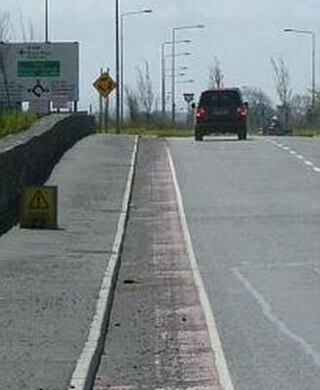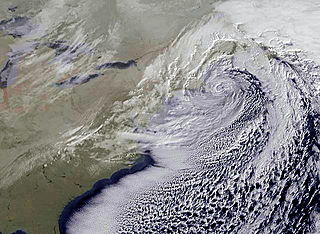Related Research Articles

Ashland is a town in Middlesex County, Massachusetts, United States. It is part of the MetroWest region. The population was 18,832 at the 2020 United States census.

A street sweeper or street cleaner may refer to a person's occupation or to a machine that cleans streets.

Marine debris, also known as marine litter, is human-created waste that has deliberately or accidentally been released in a sea or ocean. Floating oceanic debris tends to accumulate at the center of gyres and on coastlines, frequently washing aground, when it is known as beach litter or tidewrack. Deliberate disposal of wastes at sea is called ocean dumping. Naturally occurring debris, such as driftwood and drift seeds, are also present. With the increasing use of plastic, human influence has become an issue as many types of (petrochemical) plastics do not biodegrade quickly, as would natural or organic materials. The largest single type of plastic pollution (~10%) and majority of large plastic in the oceans is discarded and lost nets from the fishing industry. Waterborne plastic poses a serious threat to fish, seabirds, marine reptiles, and marine mammals, as well as to boats and coasts.

Spectacle Island is a 114-acre island in Boston Harbor, 4 miles (6.4 km) offshore of downtown Boston, Massachusetts. It is part of the city of Boston. The island has a varied history, and today is a public park with a marina, visitor center, cafe, lifeguarded swimming beach, and five miles of walking trails, forming part of the Boston Harbor Islands National Recreation Area. It is served all year by ferries from Boston, and on weekends and summer weekdays by a shuttle boat to and from nearby islands.

The Great Pacific garbage patch is a garbage patch, a gyre of marine debris particles, in the central North Pacific Ocean. It is located roughly from 135°W to 155°W and 35°N to 42°N. The collection of plastic and floating trash originates from the Pacific Rim, including countries in Asia, North America, and South America.

A winter service vehicle (WSV), or snow removal vehicle, is a vehicle specially designed or adapted to clear thoroughfares of ice and snow. Winter service vehicles are usually based on a dump truck chassis, with adaptations allowing them to carry specially designed snow removal equipment. Many authorities also use smaller vehicles on sidewalks, footpaths, and cycleways. Road maintenance agencies and contractors in temperate or polar areas often own several winter service vehicles, using them to keep the roads clear of snow and ice and safe for driving during winter. Airports use winter service vehicles to keep both aircraft surfaces, and runways and taxiways free of snow and ice, which, besides endangering aircraft takeoff and landing, can interfere with the aerodynamics of the craft.

Athmar Park is a residential neighborhood in southwest Denver, Colorado. It consists mostly of all-brick ranches and bungalow-style homes built in the 1940s and 1950s.
A garbage patch is a gyre of marine debris particles caused by the effects of ocean currents and increasing plastic pollution by human populations. These human-caused collections of plastic and other debris, cause ecosystem and environmental problems that affect marine life, contaminate oceans with toxic chemicals, and contribute to greenhouse gas emissions. Once waterborne, marine debris becomes mobile. Flotsam can be blown by the wind, or follow the flow of ocean currents, often ending up in the middle of oceanic gyres where currents are weakest. Garbage patches grow because of widespread loss of plastic from human trash collection systems.

The climate of Massachusetts is mainly a humid continental climate, with hot, humid summers and cold, snowy winters and abundant precipitation. Massachusetts is a state located in the New England region of the northeastern United States. Most of its population of 7.0 million live in the Boston metropolitan area. The eastern half of this relatively small state is mostly urban and suburban. Massachusetts is the most populous of the six New England states and ranks third in the nation by population density and fourth by GDP per capita. Massachusetts receives about 43 inches or 1,090 millimetres of rain annually, fairly evenly distributed throughout the year, slightly wetter during the winter. Summers are warm with average high temperatures in July above 80 °F or 26.7 °C and overnight lows above 60 °F or 15.6 °C common throughout the state. Winters are cold, but generally less extreme on the coast with high temperatures in the winter averaging above freezing even in January, although areas further inland are much colder. The state does have extreme temperatures from time to time with 100 °F or 37.8 °C in the summer and temperatures below 0 °F or −17.8 °C in the winter not being unusual.

Waterbury station is a commuter rail stop on the Waterbury Branch of the Metro-North Railroad's New Haven Line, located on Meadow Street in Waterbury, Connecticut. It is the northern terminus of the Waterbury Branch.

Road debris, a form of road hazard, is debris on or off a road. Road debris includes substances, materials, and objects that are foreign to the normal roadway environment. Debris may be produced by vehicular or non-vehicular sources, but in all cases it is considered litter, a form of solid waste. Debris may tend to collect in areas where vehicles do not drive, such as on the edges (shoulder), around traffic islands, and junctions.

A parking chair is a chair that is used by a vehicle owner to informally mark a parking space as reserved. Other objects are also used for this purpose, including trash cans, ladders, ironing boards, traffic cones, and similar-sized objects. In Boston, these are known as parking space savers or just space savers. For curbside parking spaces, two or more items are normally used; for angle spaces, only one is needed.

The December 2010 North American blizzard was a major nor'easter and historic blizzard affecting the Contiguous United States and portions of Canada from December 22–29, 2010. From January 4–15, the system was known as Windstorm Benjamin in Europe. It was the first significant winter storm of the 2010–11 North American winter storm season and the fifth North American blizzard of 2010. The storm system affected the northeast megalopolis, which includes major cities such as Norfolk, Philadelphia, Newark, New York City, Hartford, Providence, and Boston. It brought between 12 and 32 inches of snow in many of these areas.

The December 2013 North American storm complex was a significant storm complex that included many different types of severe weather, including a winter storm, a crippling ice storm and a tornado outbreak that impacted the central and eastern portions of Canada, parts of the Central Great Plains, the Southern United States, and the northeastern United States from 20 to 23 December 2013. Formed in the South Central United States, the storm headed across the Great Plains towards Canada into Atlantic Canada and northeastern United States where the storm dissipated on 23 December 2013. The storm produced freezing rain and snow to the affected areas which caused massive damage to electric power transmission and trees. The storm resulted in 29 deaths, loss of power to over a million residents and over $200 million in damages. The storm produced similar conditions to the ice storm of 1998 which affected similar areas.

The January 2015 North American blizzard was a powerful and severe blizzard that dumped up to 3 feet (910 mm) of snowfall in parts of New England. Originating from a disturbance just off the coast of the Northwestern United States on January 23, it initially produced a light swath of snow as it traveled southeastwards into the Midwest as an Alberta clipper on January 24–25. It gradually weakened as it moved eastwards towards the Atlantic Ocean, however, a new dominant low formed off the East Coast of the United States late on January 26, and rapidly deepened as it moved northeastwards towards southeastern New England, producing pronounced blizzard conditions. The nor’easter then gradually weakened as it moved away into Canada. The storm was also given unofficial names, such as Blizzard of 2015, and Winter Storm Juno.

Mr. Trash Wheel, officially called the Inner Harbor Water Wheel, is a trash interceptor, a vessel that removes trash from the Jones Falls river as it empties into the Inner Harbor in Baltimore, Maryland. It is powered by water wheels and solar cells, and places trash from the harbor onto an onboard conveyor belt which routes it into dumpsters on the vessel. Mr. Trash Wheel was invented by John Kellett in 2008, who launched a pilot vessel at that time. A larger vessel was later developed; it replaced the pilot vessel and was launched in May 2014. The Mr. Trash Wheel vessel is part of the Waterfront Partnership of the City of Baltimore's "Healthy Harbor Plan."

Cold-weather biking, cold-weather cycling, or winter biking is the use of a bicycle during months when roads and paths are covered with ice, slush and snow. Cold weather cyclists face a number of challenges in near or below freezing temperatures. Urban commuters on city streets may have to deal with "[s]now, slush, salt, and sand", which can cause rust and damage to metal bike components. Slush and ice can jam derailleurs. Some cyclists may bike differently in winter, by "slow[ing] down on turns and brak[ing] gradually" in icy conditions. Gaining traction on snow and ice-covered roads can be difficult. Winter cyclists may use bikes with front and rear fenders, metal studded winter tires and flashing LED lights. Winter cyclists may wear layers of warm clothes and "ea[r], face, and han[d]" coverings may be used. Specialized winter bikes called fatbikes, which have wide, oversized tires that are typically inflated with low pressure, are used in snow trail riding and winter bike competitions.

Haymarket in Boston is an open-air market on Blackstone, Hanover, and North Streets, next to the Rose Fitzgerald Kennedy Greenway between the North End and Government Center.

A trash interceptor is a device in a river to collect and remove floating debris – before the debris flows out into a harbor, for instance.

A significant and deadly severe weather event that affected the Southeastern United States on March 3, 2019. Over the course of 6 hours, a total of 41 tornadoes touched down across portions of Alabama, Georgia, Florida, and South Carolina. The strongest of these was an EF4 tornado that devastated rural communities from Beauregard, Alabama, through Smiths Station, Alabama to Talbotton, Georgia, killing 23 people and injuring at least 100 others. Its death toll represented more than twice the number of tornado deaths in the United States in 2018 as well as the deadliest single tornado in the country since the 2013 Moore EF5 tornado. An EF3 tornado also destroyed residences to the east of Tallahassee in Leon County, Florida, and was only the second tornado of that strength in the county since 1945. Several other strong tornadoes occurred across the region throughout the evening of March 3 and caused significant damage. A large number of EF0 and EF1 tornadoes also touched down.
References
- ↑ Seeyle, Katharine (6 July 2015). "Remnant of Boston's Brutal Winter Threatens to Outlast Summer". New York Times . Retrieved 6 July 2015.
- ↑ Levitz, Jennifer (18 June 2015). "Where Bad Winter Memories Go to Slowly Melt". Wall Street Journal . Retrieved 6 July 2015.
- ↑ DeLuca, Nick (25 June 2015). "30-Tons of Trash Was Removed From the Snow Pile Still Sitting in Southie". BostInno. Retrieved 6 July 2015.